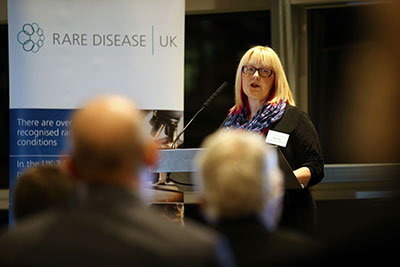Over the last 7 years I have followed with great interest the development of Rare Disease Day (RDD) and have attended a number of the receptions held in Wales. Therefore, I was delighted when I was invited to present at the Senedd event this year. My 27 year old son, Trystan, was diagnosed with Tuberous Sclerosis Complex (TSC) when 8 months old and is severely affected by the disorder; this was a wonderful opportunity and a prestigious platform on which to raise TSC awareness.
RDD launched in 2008, aims to have the last day of February recognised officially by the World Health Organisation as ‘Rare Disease Day’ and to raise increasing awareness of rare diseases worldwide and their impact on patients’ lives.
The Rare Disease Day 2014 events in the UK kicked off in the Wales at the Senedd on the 11th February. It was the first of 4 UK receptions organised by RD UK, to be followed later in the month with events in Ireland, Scotland and England.
RRD UK link: http://www.raredisease.org.uk/
Is a particularly exciting time as this year RRD UK is focusing on the importance of implementing the UK Strategy for Rare Diseases, which was launched in November 2013.
Link to UK Rare Disease Strategy: https://www.gov.uk/government/publications/rare-diseases-strategy
The Senedd event was well attended with a good mix of representatives from Welsh Government (WG), NHS Health Trusts, Pharmaceutical Companies, Genetic Alliance & RD UK, Support Organisations and of course Professor Julian Sampson and a number of his team from the Institute of Medical Genetics at Cardiff University and Wales Gene Park. There was certainly an air of optimistic expectation within the busy interactions.
Prior to my allocated slot, Dr Chris Jones, Deputy Chief Medical Officer presented on behalf of the Welsh Government and he spoke about the Welsh Delivery Plan, due to be launched on Rare Disease Day and how this will affect patients with rare conditions in Wales.
I began my presentation by sharing a little on TSC and on family life as it really is, the heartbreak of witnessing seizures; the impact of autism; the difficulties juggling heath and care needs of an adult who requires 24/7 support; the frustrations of navigating service land and the lack of adequate and timely health care and treatment.
As I spoke I observed a mother openly crying, a policy maker scribbling notes and the occasional nod or smile from my attentive audience, all whilst a young child was playing at the back of the Foyer; the child became agitated and started crying and sadly the family left; it crossed my mind, the numerous occasions we have had to make a hasty retreat from gatherings, formal and informal!
As a mother, carer and advocate I spoke too, of hopes for the future; the UK Strategy for Rare Disease gives us a clear expectation of what the NHS aspires to provide across the UK.
I am grateful to RD UK for inviting me to speak at this year’s event.
My hope, for all with a rare disease, is that these delivery plans in the UK will be the definitive tools we need to work together – professionals, individuals, advocates and carers to improve services and increase research.
Link to Tuberous Sclerosis Association: http://www.tuberous-sclerosis.org/







